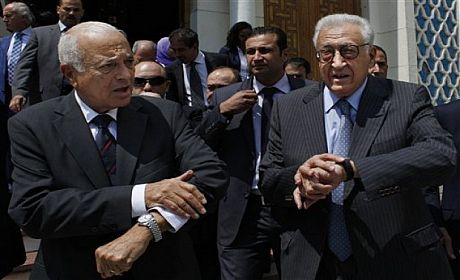Tehran’s Trapeze Artistry in Cairo’s Quartet Meeting

With regard to the Cairo Quartet, we must first understand the identity, position, and capacity of this commission:
Members of this commission are from countries with different positions with regard to Syria from the aspect of diplomatic behavior and actions. In other words, it must be said that these countries' positions are not similar to each other.
The positions, diplomatic behavior and political actions of Saudi Arabia, Turkey, and Egypt are different from the positions of the other member of this commission, i.e. Iran. The unity of these three members of the commission whose positions with regard to Syria are different from those of Iran and accepting Iran's presence in this quartet is something that should be discussed. The question that comes to mind is whether Iran has accepted this difference of opinion and entered the commission with this knowledge? Will the three important countries of Egypt, Turkey, and Saudi Arabia, which enjoy the support of an effective country like Qatar and extra-regional countries, be able to impact matters with Iran's presence in this commission or not? On the other hand, none of the other members of the resistance front, which share the same positions as Iran's and Syria's, has shown willingness to solve the Syrian crisis through this quartet. Nevertheless, Iran's entrance to this commission can be evaluated as positive from the aspect of Tehran’s positive position for a diplomatic solution to the Syrian issue. This is because Iran shows that, despite such assessments, it is still ready to negotiate with countries like Egypt, Turkey, and Saudi Arabia to solve the issue of Syria.
The issue of Syria must be studied in an equation with several unknowns. Therefore, finding a simple solution is impossible. The West is in no way ready to retreat from its position with regard to Bashar Assad and his remaining in Syria's equation. On the other hand, Bashar Assad and his supporters, the majority of whom are Alawis and religious minorities, are worried about their own future and the future of Syria. Bashar Assad does not have much time, even if we consider his demand; the breathing atmosphere for him is until the next presidential elections. Therefore, if Bashar Assad does not agree with the transition of power, considering the West's goal with regard to Syria within the framework of the theory of the burnt land and breaking the resistance, equipping the Syrian Free Army with supporters of the opposition will prepare the ground for more destruction in this country.
I have stated many times that I believe that the West wants a burnt land in Syria so that it will not be able to play a key role in regional equations; hence, perhaps there is a plan to disintegrate Syria. Therefore, the issue of Syria is multidimensional. On one side, there is resistance which Iran claims to lead, and on the other, there are the West and its regional allies which is lead by Turkey in the region and the US beyond the region. The interests of other regional players like Saudi Arabia and Egypt, and other extra-regional players like France, Germany, and Britain, must not be forgotten. This is while Russia and China take advantage of Iran and Syria as a winning card in dealing with the West. Therefore, the practical position of this quartet commission has its special complications of crisis.
Following the study of the identity and the state of affairs of the Quartet, the next level of analysis relates to the study of its capacity. This commission has appropriate capacities. If it comes to a decision to affect the behavior of opposing parties in Syria, these capacities can be utilized to solve the Syrian problem. But, my concern is that the Quartet might be used to give legitimacy to the Arab League’s future move to create a black wall around Syria in coordination with the capitals of Turkey, Egypt, Saudi Arabia, and Qatar with the backing of the West against Bashar Assad’s government. Therefore, if this commission, in parallel with Lakhdar Brahimi’s activities, cannot succeed in solving the Syrian crisis, it will take an important step in legitimizing a probable action against Bashar Assad in the region and the international system because, by involving Iran in finding a solution for the crisis and its possible defeat, justification for a possible military attack against Bashar will be easier and more acceptable for public opinion. It is in this context that Iran has entered the Quartet which entails many dangerous twists and turns and, with the smallest error, can have negative consequences for it. Moreover, Iran’s acceptance in a commission whose management balance was discussed earlier carries a defined message for elites that, following opposition to Iran’s presence in numerous conferences dealing with finding a solution for the Syrian crisis, it has been attempted to create an atmosphere for Iran in a weak diplomatic situation.

